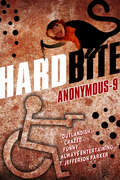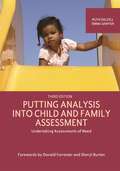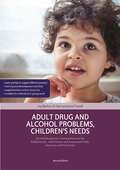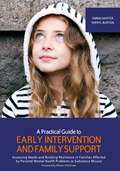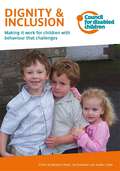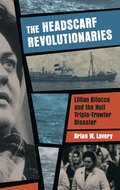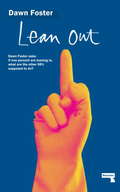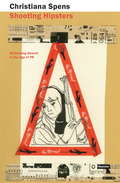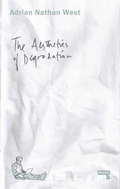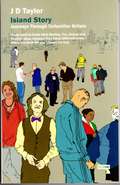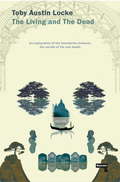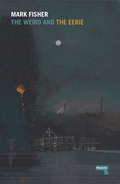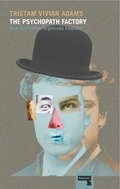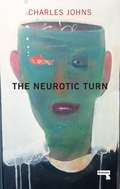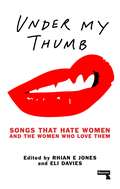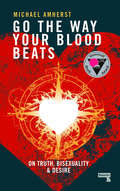- Table View
- List View
Hard Bite
by Anonymous-9Hard Bite is outlandish in every way -- a crazed noir excursion into an unprecedented heart of darkness. From the opening line on, it challenges and confronts, attacks and confounds. Violent and sometimes funny, always entertaining.
Feeding the City
by Sara RoncagliaEvery day in Mumbai 5,000 dabbawalas (literally translated as "those who carry boxes") distribute a staggering 200,000 home-cooked lunchboxes to the city’s workers and students. Giving employment and status to thousands of largely illiterate villagers from Mumbai's hinterland, this co-operative has been in operation since the late nineteenth century. It provides one of the most efficient delivery networks in the world: only one lunch in six million goes astray. Feeding the City is an ethnographic study of the fascinating inner workings of Mumbai's dabbawalas. Cultural anthropologist Sara Roncaglia explains how they cater to the various dietary requirements of a diverse and increasingly global city, where the preparation and consumption of food is pervaded with religious and cultural significance. Developing the idea of "gastrosemantics" – a language with which to discuss the broader implications of cooking and eating – Roncaglia's study helps us to rethink our relationship to food at a local and global level. The publication of this book is financed by the generous support of interested readers and organisations, who made donations using the crowd-funding website unglue.it
A People Passing Rude
by Anthony CrossDescribed by the sixteenth-century English poet George Turbervile as "a people passing rude, to vices vile inclin'd", the Russians waited some three centuries before their subsequent cultural achievements--in music, art and particularly literature--achieved widespread recognition in Britain. The essays in this stimulating collection attest to the scope and variety of Russia's influence on British culture. They move from the early nineteenth century--when Byron sent his hero Don Juan to meet Catherine the Great, and an English critic sought to come to terms with the challenge of Pushkin--to a series of Russian-themed exhibitions at venues including the Crystal Palace and Earls Court. The collection looks at British encounters with Russian music, the absorption with Dostoevskii and Chekhov, and finishes by shedding light on Britain's engagement with Soviet film. Edited by Anthony Cross, one of the world's foremost authorities on Anglo-Russian relations, A People Passing Rude is essential reading for anyone with an interest in British and Russian cultures and their complex relationship.
Xiipúktan (First of All): Three Views of the Originsof the Quechan People
by Amy Miller George BryantThe Quechan people live along the lower part of the Colorado River in the United States. According to tradition, the Quechan and other Yuman people were created at the beginning of time, and their Creation myth explains how they came into existence, the origin of their environment, and the significance of their oldest traditions. The Creation myth forms the backdrop against which much of the tribe’s extensive oral literature may be understood. <p><p> At one time there were almost as many different versions of the Quechan creation story as there were Quechan families. Now few people remember them. This volume, presented in the Quechan language with facing-column translation, provides three views of the origins of the Quechan people. One synthesizes narrator George Bryant’s childhood memories and later research. The second is based upon J.P. Harrington’s A Yuma Account of Origins (1908). The third provides a modern view of the origins of the Quechan, beginning with the migration from Asia to the New World and ending with the settlement of the Yuman tribes at their present locations. <p> This collection is for the Quechan people and will also interest linguists, anthropologists, oral literature specialists, and anyone curious about Native American culture.
Putting Analysis Into Child and Family Assessment, Third Edition: Undertaking Assessments of Need
by Donald Forrester Sheryl Burton Emma Sawyer Ruth DalzellPutting Analysis into Child and Family Assessment bridges theory and practice, and provides clear guidance to improve assessments in child and family social work. It addresses the issues of central concern to child and family social workers, including analytical assessment, outlines how to avoid common pitfalls, provides strong theoretical foundations, and demonstrates how the theory can be translated into practice. With reference to common and specialist assessments, the book covers every stage of the assessment process: planning and preparation, hypothesising, involving children, and making, recording and reviewing decisions. It features practice tools, case studies and practice development sessions and activities. This third edition has been fully updated with recent policy changes and new research findings. This book will be valued by practitioners, managers, trainers and lecturers looking for a grounded resource which provides practical guidance on how to improve assessments.
Adult Drug and Alcohol Problems, Children's Needs, Second Edition: An Interdisciplinary Training Resource for Professionals - with Practice and Assessment Tools, Exercises and Pro Formas
by Jane Powell Joy Barlow Di HartParental drug use can cause serious harm to children. Adult Drug and Alcohol Problems, Children's Needs supports practitioners in their work with families where parental drug use leads to concerns about children's welfare. The training resource contains: · summaries of the key messages for practitioners · tools and tips to support effective practice · training and development activities · practice examples from around the UK. This second edition has an increased focus on alcohol misuse and reflects recent changes to both policy and practice. The book will be useful for all individuals and agencies involved with families where parents are struggling with substance abuse, including children's social workers, substance misuse workers, primary care and school staff, criminal justice agencies, obstetric and paediatric teams, substitute carers and a range of voluntary and community services.
A Practical Guide to Early Intervention and Family Support: Assessing Needs and Building Resilience in Families Affected by Parental Mental Health Problems or Substance Misuse
by Sheryl Burton Emma Sawyer Allison O’sullivanParental mental health problems and substance misuse affect a significant number of families. This handbook provides practitioners with early intervention techniques and effective support strategies for ensuring the best outcomes for these vulnerable families. Featuring pointers, models and practice examples, A Practical Guide to Early Intervention and Family Support considers the concept of resilience and effective family support. Assessing the policy context and possible barriers to support, it looks at assessment of need, safeguarding children, minimising negative impact, and most importantly, keeping families together where possible. Drawing on key research on the risks and impacts, this book demonstrates the need for a unified approach from a range of adult and children's services. This third edition has been fully updated to reflect developments in policy and services. Essential reading for all professionals who are involved in providing services to families, it will also be of interest to service commissioners and those with an academic interest in what helps to support children and families in these circumstances.
Dignity & Inclusion: Making it work for children with complex health care needs
by Amanda Allard Jan Delamore Jeanne CarlinThis publication will help all service providers to ensure that disabled children and young people with additional support needs can access services and lead a life as part of their local community, focusing on children who require clinical procedures, children who require moving and handling and children who need intimate care as part of their personal support. Drawing on and including examples of good practice from across the country, Making it work for children with complex health care needs illustrates the ways in which all agencies can work together to develop local policies and procedures to ensure that the needs of this group of children are met in a coordinated and child-centred way. Making it work for children with complex health care needs is one of two companion publications detailing good practice in both inclusive and specialist settings across education, health, social care and leisure.
Dignity & Inclusion: Making it work for children with behaviour that challenges
by Amanda Allard Jan Delamore Jeanne CarlinThis publication will help all service providers to ensure that disabled children and young people with additional support needs can access services and lead a life as part of their local community, focusing on children who have behaviour that challenges as a result of either a severe learning disability and/or autism. Drawing on and including examples of good practice from across the country, Making it work for children with behaviour that challenges illustrates the ways in which all agencies can work together to develop local policies and procedures to ensure that the needs of this group of children are met in a coordinated and child-centred way. Making it work for children with behaviour that challenges is one of two companion publications detailing good practice in both inclusive and specialist settings across education, health, social care and leisure.
The Headscarf Revolutionaries: Lillian Bilocca and the Hull Triple-Trawler Disaster
by Brian W. LaveryWinter 1968. Three Hull trawlers sink. One fishwife vows to change the law. A powerful story of death and survival. In the harsh Arctic seas of 1968, three trawlers from Hull's fleet sank in just three weeks. 58 men died. Lillian Bilocca put down her filleting knife, wrote a petition, and stormed into action. With her army of fishwives she took her battle to the docks and led a raid on Parliament. They changed the shipping laws, 'Big Lil' became an international celebrity. The lone survivor of the tragedies made headlines too. In a tight fishing community, it's dangerous to stand out.
Lean Out
by Dawn FosterSheryl Sandberg's business advice book, Lean In, was heralded as a defining moment in attitudes to women in business. But for all its commercial success, it proposed a model of feminism that was individualistic and unthreatening to capital.In her powerful debut work Lean Out, acclaimed journalist Dawn Foster unpicks how the purportedly feminist message of Sandberg's book neatly exempts patriarchy, capitalism and business from any responsibility for changing the position of women in contemporary culture. It looks at the rise of a corporate '1% feminism', and at how feminism has been defanged and depoliticised at a time when women have borne the brunt of the financial crash and the gap between rich and poor is widening faster than ever. Surveying business, media, culture and politics, Foster asks whether this 'trickledown' feminism offers any material gain for women collectively, or acts as mere window-dressing PR for the corporations who caused the financial crash. She concludes that 'leaning out' of the corporate model is a more effective way of securing change than leaning in.From the Trade Paperback edition.
The Ballerina and the Bull
by Johanna IsaacsonOur moment has seen the resurgence of an anarchist sensibility, from the uprisings in Seattle in 1999 to the Occupy movement of 2011. Against the vacuity and drift of financialized capitalism, proclaiming there is no alternative, these insurgent movements have insisted that an alternative is possible. In The Ballerina and the Bull Johanna Isaacson explores the occult history of US punk, hardcore, queercore, and riot grrrl, DIY culture, and alternative subcultures to trace a new politics of expressive negation that both contests the present order and gives us a sense of the impasses of politics in an age of depoliticization. Expressive negation registers the contradictory politics at the heart of these projects: the desire for negation that must be positively expressed. Drawing on first- hand experience, interviews, and discussion of the ludic, spatial, and sexual politics of anarchist subcultures, Isaacson maps an underground utopian politics of style and develops a radically new history of the present moment.From the Trade Paperback edition.
Shooting Hipsters: Rethinking Dissent in the Age of PR
by Christiana SpensIn an age of PR, public protest and other forms of dissent have lost their meaning and impact. The intense media interest in rioting and political violence, as well as an existing obsession with youth culture, have led to an over-saturation and misrepresentation of what these movements are about. Political protest has become a pantomime where activists are always villains, and therefore the politics of these groups are routinely ignored. By identifying the ways in which publicity has helped and hindered a wide range of movements, Shooting Hipsters will find out the ways in which dissenting groups can thrive and survive in a media-saturated age, as well as describing the common ways that they can be undermined.
The Aesthetics of Degradation
by Adrian Nathan WestPornography keeps getting more extreme. Manufacturers, defenders and consumers of porn rely on a mix of wilful ignorance and bad faith to avoid serious discussion. When we do talk about violence against women in the porn world, the debate all too often becomes technical, complicated by legalities and outrage.But what are the moral and psychological consequences of the mercantilization of abuse?In this studied and ruthless examination of the place of pornography in contemporary life, translator and critic Adrian Nathan West treads dangerous literary and social ground, transcending cliches about free expression and the demands of the market to look at the moral discomfort of violent pornography from the perspective of the viewer.Collapsing distinctions between novel, memoir, and essay, this book will not make for light reading. But at its core is an extraordinarily brave and honest concern for the women and men who have been hurt in the name of sexual gratification.
Island Story
by J. D. TaylorWhat is life like on this island? With a tent and a rusty bike, J.D. Taylor set off to find out.No other subject has spilt so much ink as Britain today. But whilst assuming a monopoly on national identity, a London-based elite has proven a poor forecaster of the political weather around the island.Skeptical and inquisitive, Taylor instead cycled all round Britain, interviewing and staying with strangers from all walks of life. Without a map and travelling with the most basic of gear, the journey revels in serendipity and schadenfreude.Island Story weaves histories, experiences and ideas to tell another kind of story: one of rebellion and retail parks, migration and inertia, pessimism and disappearing ways of life, and a fiery, unrealized desire for collective belonging and power.Think you know the island? Island Story will have you think again.From the Trade Paperback edition.
The Living and the Dead
by Toby Austin LockeThe Living and the Dead examines the boundaries between the worlds of life and death. The text draws upon philosophy, ethnography, literature and natural science to suggest that life and death are best understood not in opposition, but as continuous tendencies acting upon one another. Austin Locke argues that the failure to give nuanced consideration to the connections between the living and nonliving devalues both life and death. In doing so, he suggests that our ability to respond to the challenges of environmental degradation, technological advancement, and the dominance of economic logic depend in part on more fluid understandings of the relationship between life and death.From the Trade Paperback edition.
The Weird and the Eerie
by Mark FisherWhat exactly are the Weird and the Eerie? In this new essay, Mark Fisher argues that some of the most haunting and anomalous fiction of the 20th century belongs to these two modes. The Weird and the Eerie are closely related but distinct modes, each possessing its own distinct properties. Both have often been associated with Horror, yet this emphasis overlooks the aching fascination that such texts can exercise. The Weird and the Eerie both fundamentally concern the outside and the unknown, which are not intrinsically horrifying, even if they are always unsettling. Perhaps a proper understanding of the human condition requires examination of liminal concepts such as the weird and the eerie.These two modes will be analysed with reference to the work of authors such as H. P. Lovecraft, H. G. Wells, M.R. James, Christopher Priest, Joan Lindsay, Nigel Kneale, Daphne Du Maurier, Alan Garner and Margaret Atwood, and films by Stanley Kubrick, Jonathan Glazer and Christoper Nolan.
The Psychopath Factory: How Capitalism Organizes Empathy
by Tristam AdamsThe Psychopath Factory: How Capitalism Organizes Empathy examines how the requirements, stimuli, affects and environments of work condition our empathy. In some cases, work calls for no empathy - characters who don't blink or flinch in the face of danger nor crack under pressure. In other cases, capitalism requires empathy in spades -charming, friendly, sensitive and listening managers, customer service agents and careers. When workers are required to either ignore their empathy to-do a job, or dial it up to increase productivity, they are entering a psychopathic modality. The affective blitz of work, flickering screens, emotive content, vibrating alerts and sounding alarms erode our sensitivities whilst we are modulated with attention stimulants, social lubricants and so called anti-anxiety drugs. This is amidst a virulent and exacerbating climate of competition and frenzied quantification. Capitalism pressures us to feign empathy and leverage social relationships on one hand, whilst being cold and pragmatic on the other. We are passionate and enthusiastic whilst keeping a professional distance. Sympathy, care, compassion and altruism are important; The Psychopath Factory: How Capitalism Organizes Empathy argues that itis a mistake to presuppose that empathy can achieve these. Rather than being subject to the late capitalist organization of our empathy, psychopathy could be a means of escape.
Down with Childhood: Pop Music and the Crisis of Innocence
by Paul RekretSometimes popular music registers our concerns and anxieties more lucidly than we realise. This is evident in the case of an ideal of childhood innocence in rapid decay in recent decades.So claims Down with Childhood, as it takes in psychedelia’s preoccupation with rebirth and inner-children, the fascination with juvenilia amidst an ebbing UK rave scene and dozens of nursery rhyme hip-hop choruses spawned by a hit Jay-Z tune.As it examines the often complex sets of meanings to which the occasional presence of children in pop songs attests, the book pauses at Musical Youth’s ‘Pass the Dutchie’ and other one-hit teen wonders, the career paths of child stars including Michael Jackson and Britney Spears, radical experiments in free jazz, and Black Panther influenced children’s soul groups.In the process, a novel argument begins to emerge relating the often remarked crisis of childhood to changing experiences of work and play and ultimately, to an ongoing capitalist crisis that underlies them.
Futures and Fictions
by Simon O'Sullivan Henriette Gunkell Ayesha HameedFutures and Fictions is a book of essays and conversations that explore possibilities for a different ‘political imaginary’ or, more simply, the imagining and imaging of alternate narratives and image-worlds that might be pitched against the impasses of our neoliberal present. In particular, the book contributes to prescient discussions around decolonization, post-capitalism and new kinds of social movements – exploring the intersections of these with contemporary art practice and visual culture. Contributions range from work on science, sonic and financial fictions and alternative space-time plots to myths and images generated by marginalized and ‘minor’ communities, queer-feminist strategies of fictioning, and the production of new Afro- and other futurisms.
The Neurotic Turn
by Charles JohnsTaking their cue from the work of Charles Johns, who has argued that, far from being an ailment, neurosis is in fact the dominant condition of our society today, an array of thinkers have gathered in The Neurotic Turn to address the question: what can ‘neurosis’ tell us about our current social impasse?What emerges in The Neurotic Turn is the awareness that the medicalization of neurosis was merely provisional. Today, to understand our increasingly synthetic, digitized world, we cannot retreat from neurosis, or pretend to offer its cure. Instead, we must confront it — dispensing with the conventional idea of ‘reality’ in order to redefine it.
Under My Thumb: Songs That Hate Women and the Women That Love Them
by Rhian Jones Eli Davies Tamar ShlaimDiscussions and analyses of music – whether on TV, in books or in the music press – have always been full of the stories of men. When female fans appear in these stories it is often through the eyes and from the perspectives of men – as muses, groupies or fangirls – meaning that women’s own experiences, ideas and arguments about the music they love are marginalised or glossed over. Women in music are frequently fetishised and objectified both in song lyrics and in real life, viewed purely in relation to men and through their impact on the male ego. But this hasn’t stopped generations of women from loving, being moved by and critically appreciating music – however that music may feel about them.Under My Thumb: The Songs that Hate Women and the Women Who Love Them is a study of misogyny in music through the eyes of women. It will bring together stories from music writers and fans about artists or songs they love despite their questionable or troubling gender politics, as well as looking at how these issues intersect with race, class and sexuality.The collection explores the joys of loving music and the tensions, contradictions and complexities it can involve. It is intended to be as much celebration as critique - a kind of feminist guilty pleasures.
Go the Way Your Blood Beats: On Truth, Bisexuality and Desire
by Michael AmherstUsing bisexuality as a frame, Go the Way Your Blood Beats questions the division of sexuality into straight and gay, in a timely exploration of the complex histories and psychologies of human desire. A challenge to the idea that sexuality can either ever be fully known or neatly categorised, it is a meditation on desire’s unknowability. Interwoven with anonymous addresses to past loves - the sex of whom remain obscure - the book demonstrates the universalism of desire, while at the same time the particularity of each individual act of desiring. Part essay, part memoir, part love letter, Go the Way Your Blood Beats asks us to see desire and sexuality as analogous with art - a mysterious, creative force, and one that remakes us in the act itself.
A Life Lived Remotely
by Siobhan McKeownWhat happens when we take our lives online? How are we being changed by immersion in the internet? How do we know the difference between work and life when one seems to blend into the other?Part memoir, part theory, A Life Lived Remotely tells the story of a transition to the digital age. It follows the author's journey through remote work, framing it within the exponential growth of the internet and the rapid spread of neoliberalism. It examines how we are being changed by the internet, how we experience that change, and at the anxieties and issues that arise. A moment's pause in a world of fast-paced communication, it provides a critical reflection on what it means to come of age along with the internet.
Shard Cinema
by Evan Calder WilliamsShard Cinema tells an expansive story of how moving images have changed in the last three decades and how they changed us along with them, rewiring the ways we watch, fight, and navigate an unsteady world. With a range that spans film, games, software, architecture, and military technologies, the book crosses the twentieth century into our present to confront a new order of seeing and making that took slow shape: the composite image, where no clean distinction can be made between production and post-production, filmed and animated, material and digital. Giving equal ground to costly blockbusters and shaky riot footage, Williams leads us from computer-generated “shards” of particles and debris to the broken phone screen on which we watch those digital storms, looking for the unexpected histories lived in the interval between.
